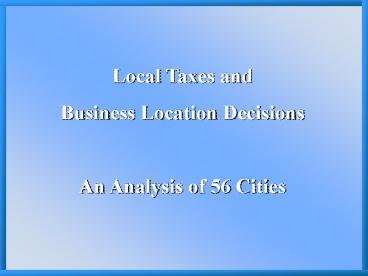Summary Overview PowerPoint PPT Presentation
1 / 12
Title: Summary Overview
1
Local Taxes and Business Location Decisions An
Analysis of 56 Cities
2
Summary Overview
- Research Question
- Do Local Taxes on Business Influence
Intrametropolitan Business Location Decisions? - Methods
- Regression Study Examining 56 Los Angeles Cities
- Preliminary Findings
- Business Taxes Do Not Have Significant Impact
- Improving the Model
- Better Data and More of It
3
Why Is This Topic Important?
- So What If Local Taxes Influence Business
Location Decisions? - Economic Growth
- Competition Between Cities
- Efficiency
- Equity
- What Others Have Found
- Intrametropolitan Tax Elasticity Ranges
- (1.0 to 3.0)
- The City of Los Angeles Wants to Know
4
Methods Regression Model
Local Business Climate
Local Business Tax/Total Revenue, and Local
Business Expenditure/Total Expenditure (1997)
Exec. Personal Preferences
Local Business Activity
White, Latino, Black, Other Race(s), and
School Quality (per pupil spending) (2000)
Available Labor Force
Employment / Sq. Mile (2000)
Population Density, w/ College Degrees, and
Age 18 to 64 (2000)
Additional Cost Factors
Crime Rate, Poverty Rate, Highway Miles/Area,
Rail Miles per Area, and Median Distance to LAX
(2000)
5
Methods - Functional Form
- Logical Form of the Relationship
Empl / Sq. Mile (Empl Density)
Local Business Tax / TR ( Local Business Tax)
- Chose Semi-log (Log Linear) Form
- - Studenmund Ch. 7
6
Methods Specifying the Equation
Ln employment density1 a b1 percent
local business tax b2 population density b3
percent white b4 percent black b5 crime rate
(per thou) b6 percent w/ 4 year degree b7
percent work age b8 percent poverty b9
percent local business expenditure
1 Expected Value
7
Methods Examining the Model
- Multicolinearity
- Partial Correlation Coefficients
- None Stat Sig. Above 0.8
- Variance Inflation Factors (VIF)
- None above 5
- Heteroskedasticity
- Ran Logged Square of Residuals Against
- Logged Population Density
- Logged Square Miles
- Logged Population
- None Statistically Significant
8
Preliminary Findings
- Scatter Plot Shows No Relationship
Ln Employment Density 7.82 -0.01 Local Tax
R-Square 0.00
X
X
X
X
9.00
X
X
X
X
X
X
X
X
X
X
X
X
X
8.00
X
X
X
X
X
X
X
X
X
X
X
X
X
X
X
X
X
X
X
X
X
X
X
X
X
X
X
X
7.00
X
X
X
X
Ln Employment Density
X
X
X
6.00
X
X
X
5.00
X
4.00
20.00
30.00
40.00
50.00
60.00
Percent Local Tax
9
Preliminary Findings
- Linear Regression Shows No Relationship
Coefficients
a
Standardized
Unstandardized
Coefficients
Coefficients
t
Sig.
B
Std. Error
Beta
2.625
2.154
1.219
.229
(Constant)
6.7E-05
.000
.349
2.476
.017
Population Density
-1.E-02
.007
-.246
-1.909
.062
Percent White
-1.E-02
.012
-.128
-1.022
.312
Percent Black
.115
.394
3.109
.003
Crime Rate
.356
-7.E-03
.011
-.117
-.633
.530
Percent 4 Yr Degree
8.3E-02
.037
.339
2.255
.029
Percent Work Age
-2.E-02
.026
-.137
-.727
.471
Percent Poverty
5.1E-03
.011
.057
.481
.632
Percent Local Tax
-2.E-02
.007
-.285
-2.366
.022
Percent Local Exp.
Dependent Variable Log Employment Density
a.
R2 Ad. R2 .619 .545
F-Stat Sig. 8.314 .000
10
Preliminary Findings
Regression Equation Log Employment Density1 a
.00067 Pop Density - .001 Percent White .356
Crime Rate .083 Percent Work Age - .02 Percent
Local Expenditure
- Interpretation of Coefficients2
- If X1 increase by one unit, Y changes in
percentage terms. - Example
- As Pop Density increases by 1 person per square
mile, - Employment Density increases by .067 .
1 Expected Value 2 Studenmund Ch. 7
11
Improving the Model
- Better Data on
- Taxes and Expenditures (US Census Unit File)
- Executive Preferences (Only Considered Race?)
- Additional Cost Factors (Transportation)
- Separate Tax Variables (Lumped Together)
- More Observations
- Time (1990, 2000)
12
Other Suggestions?
- Start All Over
- Give It Up
- Full Speed Ahead

